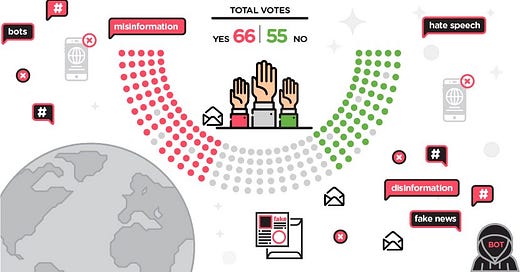France vs Fake News
We all know that all politicians are terribly concerned about Fake News® and interference with elections. Really, they tell us all of the time. If you're interested the Poynter Institute is now monitoring what various countries are doing to deal with the problem.

In Canada that means :
... a multi-pronged effort to combat misinformation ahead of elections in the fall.
... the government created a “Critical Election Incident Public Protocol” that will monitor and notify other agencies and the public about disinformation attempts. That task force will be led by five non-political officials and is an addition to a “rapid response mechanism” housed within the Department of Foreign Affairs.
Second, the government called on social media platforms to do more to combat disinformation ahead of the election. The move comes in tandem with Bill C-76, legislation that aims to compel tech companies to be more transparent about their anti-disinformation and advertising policies.
Third, Canada announced it was giving $7 million to projects aimed at increasing public awareness of misinformation online."
If you translate that from political-speak it basically adds up to a) we'll watch really, really closely and b) and ask Facebook really, really nicely to do something. I think we all know how well that will work. Even with a robust "public awareness" campaign, or as it is also known "blame the end user for not being clever enough to tell "real" news from "fake" news."
The law, which passed in November, provides a definition of “fake news”: “Inexact allegations or imputations, or news that falsely report facts, with the aim of changing the sincerity of a vote.” It’s designed to enact strict rules on the media during electoral campaigns and, more specifically, in the three months preceding any vote.
The legislation gives authorities the power to remove fake content spread via social media and even block the sites that publish it, as well as enforce more financial transparency for sponsored content, in the three months before election periods. That builds upon an 1881 law that outlaws the dissemination of “false news.”
The law contains three major provisions. First, a judge is authorized to act “proportionally” but “with any means” to halt the dissemination of misinformation before elections. For the judge to act, a specific request must be filed by political groups, public authorities or individuals. The judge “acts within a delay of 48 hours from the notification.”
Second, platforms such as Facebook, Twitter and YouTube will be required to publish who has purchased sponsored content or campaign ads and for what price. That component takes a page from the United States’ Honest Ads legislation, which applies existing standards for TV and radio stations to social media.
And finally, the law grants the Higher Audiovisual Council (CSA), the broadcasting regulator, new administrative and executive powers to ensure that platforms abide by the law. It will “publish a regular report” regarding the effectiveness of measures enacted by platforms. Additionally, the CSA can now “unilaterally” revoke the broadcast rights of TV and radio outlets operating on French territory who are found to work “under the control or influence of a foreign state” and “disseminate misinformation.”
Now let's get this clear. In France, right now, you can file a complaint about mis-information and a judge will decide on it within 48 hours. And the broadcast regulator can shut down radio and TV stations that are controlled by foreign governments and spreading fake news. I cannot conceive of that ever happening in Canada. Ever.
All of this speaks to a governmental culture that still see a role in making society better instead of just rolling over when any large corporation claims that regulation will hurt their bottom-line.




